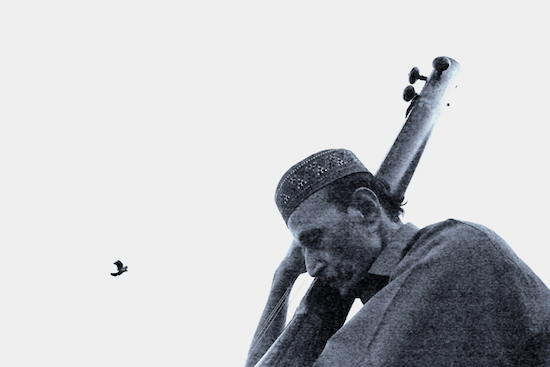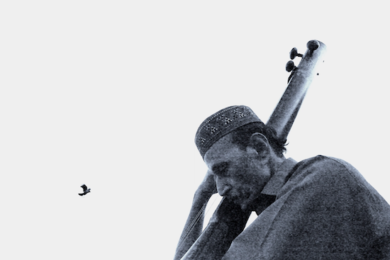This feature was written by Dirk Baart and originally published in Dutch in Front magazine and translated for tQ, with their permission, by Jasper Willems
Each and every day, the life of Ustad Naseeruddin Saami, 75, is in danger. Saami is the embodiment of a century-old musical tradition passed on by his ancestors. A tradition that’s fiercely repelled by fundamentalists within Pakistan’s Islamic communities. Though Ustad Saami has passed on his wisdom to his sons and students, he is still the only soul on earth with the knowhow to perform all forty-nine notes that encompass the astonishingly intricate khayál-technique. When Ustad Saami dies, these forty-nine notes die with him. But now, for the very first time, his music has been captured on a record and he will give a very rare performance outside of Pakistan, at Le Guess Who? in Utrecht, The Netherlands.
In 2016, American producer Ian Brennan received a mail from Karachi, the heart of Pakistan and one of the largest cities in the world. Ali Sethy and Zeb Bangash, two of Ustad Saami’s students, asked him if he could fly over to Asia to record an album with their esteemed teacher. Brennan didn’t hesitate for a moment; empowering marginalised voices in music has always been his calling card. In 2012, he won a Grammy for his contribution to Tassili, an album recorded by Malian/Berber Tuareg-band Tinariwen. Four years later, he was nominated again as the producer of the Zomba Prison Project-album I Have No Everything Here, with songs composed by inmates of the high-security facility within Zomba Prison in Malawi. He followed that endeavour with a book: How Music Dies (Or Lives): Field Recordings And The Battle For Democracy In The Arts.
“I’ve been making music my entire life”, the producer asserts over the phone in Italy, where he now lives with his wife, photographer Marilena Delli. “Since I was four or five years old, that’s all I ever wanted to do.” As a musician, Brennan was only marginally successful. In his teens and twenties, he started releasing music at an exponential rate, but that big break never happened. In other words: Brennan is fully aware of how not to make records.
Instead, he hung his hat on listening, more specifically, listening to and with others. “I wanted to amplify the words of other people”, he explains. “I was never so much interested in ownership; the existence of something has always been more important to me than its origin. In the end, the most important inventions of mankind have been anonymous. Language and practices, for example. There should be a statue in every city for people who think of those type of things. But instead, we choose to throw ourselves at the feet of pop stars who are perhaps only marginally more talented than us.”
Brennan isn’t exactly interested in pop stars, and the same goes for “white guys with guitars singing in English” – in his own words. His mission started to take shape when he and his wife landed in Rwanda. “We were there to visit her mother, but concurrently, we were eager to discover music as well. Not for recording purposes, but basically to educate ourselves.” It was here Brennan and Delli discovered The Good Ones, a trio comprised of every tribe in the land, each member surviving the Rwandan genocide of 1994. The band is set to release their third album this year. “Having these kinds of experiences, I learn things I still don’t fully understand myself. But I hope they will contribute to the world – and the lives of the people involved in these projects – in some meaningful way.” Brennan’s mission took him to the South of Sudan, Tanzania, Cambodia, Romania, and finally Malawi… and then he ended up having an audience with Ustad Saami in Pakistan.
After Saami’s students reached out to Brennan, it took a full year for the producer to finally make his way to Pakistan. Once he set foot, he and Ustad – ‘Ustad’ being the official title of ‘master – quickly hit it off. They don’t understand each other’s language, but nevertheless, they understand each other. “In some ways, it was actually easier this way, because we could fully focus our attention on what’s truly important: the music.” Brennan has set a particular goal: make sure that the full range of Ustad’s voice is on display so that it will reach beyond Pakistani frontiers.
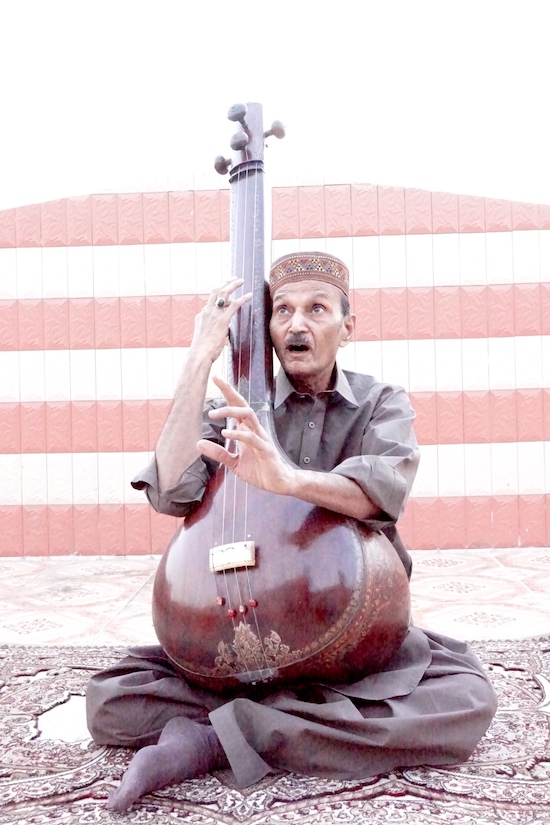
Ustad Saami is the last living practitioner and upholder of a singular symbiosis of two musical disciplines: khayál (Arab for ‘fantasy’), a strand of classical music derived from the Indian subcontinent, and Qawwali, a form of Sufi-Islamic devotional music pioneered in the 13th century by musician and poet Amir Khusrau, considered by many as the successor to khayál. The latter reached a pinnacle of popularity in the seventies, but nowadays, its very existence is under legitimate threat of Islamic fundamentalism. In the summer of 2016, famed Qawwali-singer Amjad Farid Sabri was assassinated after a television performance. His car was intercepted by two motorcyclists on a bridge named after his father. Sabri’s funeral was attended by over 10,000 people, and his music is still performed across the globe to pay tribute to him. Furthermore, Pakistan president Mamnoon Hussain awarded Sabri a posthumous Sitara-i-Imtiaz (Star Of Excellence), the third-highest attainable title of the country.
Unfortunately, the violence never diminished: in that very same year, several more attacks on Pakistani Sufis occured. In November 2016, at least 52 people were killed during a bombing of a Sufi-shrine in the province of Baluchistan. The culprits are usually terrorist extremists like the Taliban, Al Qaeda, or the Islamic State. They harbour deep resentment against Sufism, which promotes a peaceful and tolerant form of Islam. It’s not a radical subdivision of Islam but a mystical dimension within it, practiced by both Sunnis and Shiites.
Sufis look for God within themselves and reject any form of materialism. Instead, they follow a spiritual school of learning known as tariqa, making them students of some of the most beautiful Islam-rooted music and literature, such as the love letters of Iranian author Rumi. Fundamentalists argue that Sufism defects from Islam as imparted by the prophet Mohammed. They condemn Muslims who don’t just worship God, but also Sufi-clerics like Abdullah Shah Ghazi, the patron saint of Karachi. A fraction of the Muslim-community believes that Mohammed has forbidden the act of singing and playing instruments altogether.
“The danger is real”, Brennan stresses. “But in the end, it’s coming from a very small group of people, the most extreme of fundamentalists. They are just as prevalent in the US. Yesterday, a man shot down five people… it’s not even news anymore.” He explains that Pakistan is a very diverse and progressive country. The capital of Karachi is a melting pot of a wide range of demographics, including two million immigrants from Bangladesh, one million refugees from Afghanistan and 400,000 Rohingyas, an Indo-Aryan ethnic group from Myanmar. “It’s very important for me to show how complex these regions indeed are. You can’t capture a country of 200 million people in a single narrative, especially if that narrative is routinely negative and provocative.”
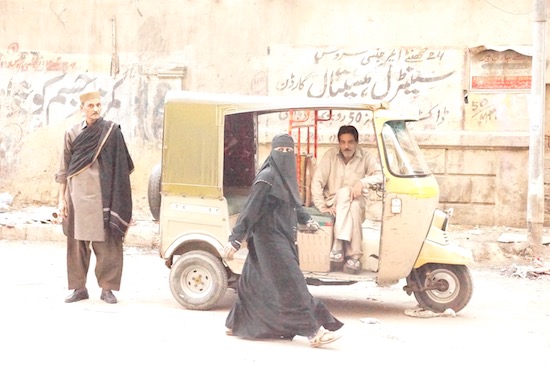
God Is Not A Terrorist, the somewhat Delphic title of Ustad Saami’s very first set of recordings, sprang from an intent to highlight a more nuanced, alternative side of the region. “Ustad kept saying, ‘To sing is to listen.’ His name even translates directly as ‘listening’. He strongly believes that nearly all of the world’s problems are derived from a lack of listening. In other words: if people would listen to each other more, there would be world peace.”
The sessions for God Is Not A Terrorist didn’t take place in some slick studio space in the heart of the city. Instead, the first recordings took place spontaneously between the walls of the hotel room Brennan was staying. Down the line, the ensemble moved to the master’s own residence, its upper story converted into a makeshift rehearsal space. The roof terrace offered a pretty majestic view of the city skyline, the fringes of the Kirthar mountains and the Arabic Sea visible on each side. As Brennan set up his equipment, Ustad’s sons – known as the Saami Brothers – accompanied their father and teacher on Tabla drums and Tanpura (an Indian string instrument). The master himself was perched cross-legged under a portrait of one of his ancestors.
“My method of recording coincides nicely with what Ustad wanted to do someday in the first place: recording at home with his family, not in some polished studio. Live, and without overdubs. And because he’s a master, there is no need to record a hundred takes. Impossible even, because this music is so demanding to grasp that most don’t even bother to begin learning it.” As someone who has frequently recorded with people with no prior experience within a professional recording environment, Brennan has seen his share of different scenarios. “This is a whole other side of that spectrum: Ustad Saami is a man whose whole life has been utterly devoted to music.”
It has been so for over half a century. Ustad Saami was born in 1944 in a family of musical greats. His ancestor Mian Samad Bin Ibrahim was actually the most prodigious student of the aforementioned Amir Khusrau, which explains how he got immersed within the influential Qawwali and khayál-practices in Delhi. Saami started studying in the fifties: he was just eleven when he enlisted with his uncle and mentor Ustad Munchi Raziuddin, who passed away in 2003. It was Raziuddin who taught Ustad those elusive forty-nine microtones: within each octave, there are seven times as many tones as in most Western music disciplines. Ustad Saami happens to be the only individual still alive who has mastered each and every one. A soon-to-be lost art. “He does have students, but there’s a huge question mark on whether they’ll be able to carry the torch. It’s not something you simply learn: it takes incredible dedication to perform this type of music.”
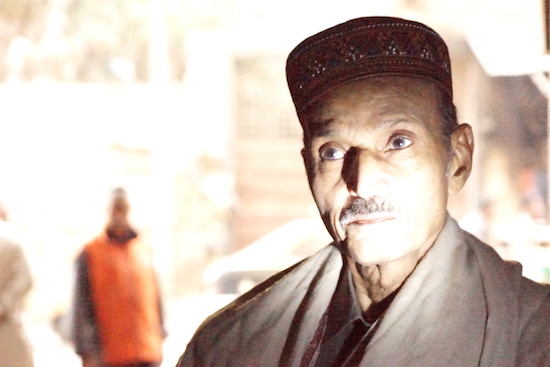
To further illustrate that level of dedication: during the recording process, Ustad Saami and Brennan went the distance until the wee small hours, in order to capture as much music as possible. “He knows a ridiculous amount of music… some workouts could fill an entire CD, because they are over an hour in length and additionally, they get a reprise of twenty minutes. We have assembled enough material for a good four, five records, I believe.” The biggest reason they pulled these ‘all nighters’ however, is embedded within the tradition itself. Certain parts of Ustad Saami’s music correspond specifically with certain moments in the day: one for sunset, another for sundown, whereas additional movements relate to the median of the day and midnight.
To cut a long story short: all the pieces recorded for God Is Not A Terrorist were carefully attuned to a certain moment. “(Ustad) never has off days, but that night, in particular, he was feeling extra good. So the majority of the album comes from that night.” There were certain instances when Ustad Saami genuinely gave Brennan the heebie-jeebies, he remembers. “His music is so powerful, it can be a bit frightening actually. Here’s a man who is 75 years old and can use his voice in the span of twelve minutes that’s ten times heavier than anything Metallica has ever produced. A man who is far more audacious and edgy than all those bands who have spent their entire careers trying to be audacious and edgy. Those are a handful of the reasons why this album exists in the first place.”
That and, of course, the notion that Ustad Saami’s music was never before captured on a record. It’s anybody’s guess how long he’ll be able to perform the music the way he has been doing for fifty years. Additionally, live performances by the Pakistani master have become increasingly rare. “It speaks for itself that this was all overdue”, Brennan concurs. “But in this case, I wanted to do it as quickly as possible, because Ustad Saami’s music should have been spread and celebrated like this a long time ago. On top of that, I think the record sounds terrific and wholly modern. We could talk for several hours about the thousands of years of tradition from which this album stemmed. It’s all extremely interesting and beautiful, but in the end, it doesn’t make much difference for this album. The most important thing is that this album can’t be compared to anything else out there. Consider it a challenge for all other musicians: ‘Who on earth could make a more modern record than this one?’”
God Is Not a Terrorist is the fifth chapter of the lauded Hidden Musics-series of German imprint Glitterbeat. Ustad Saami will perform at Le Guess Who? 2019 on Saturday, 9 November

